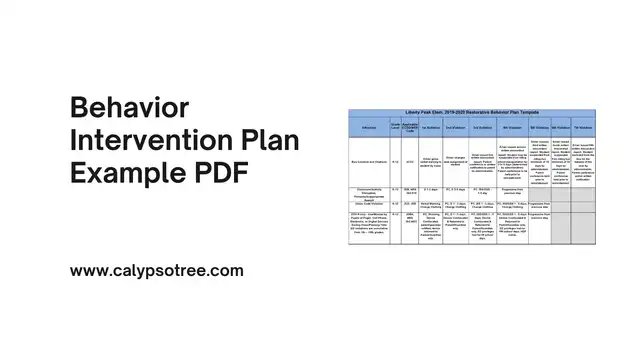Do you love finding new ways to help businesses grow? If so, a job as a Business Development Manager (BDM) might be the perfect fit for you! This job description for a business development manager will tell you all about what they do, what skills they need, and how to become one.
Job Description for a Business Development Manager: Key Duties
BDMs wear many hats! Here’s a look at their most important roles:
- Market Sleuths: BDMs dig deep to understand markets, figure out what customers want, and spot hidden opportunities for the company to jump on.
- Lead Generators: They’re always on the hunt for new clients. This means reaching out to potential partners, making connections, and building relationships.
- Relationship Gurus: BDMs get to know clients, figure out their needs, and build trust to create lasting partnerships.
- Master Proposers: They are great at writing convincing plans that show how the company will help clients. This helps them win big deals!
Skills and Qualifications of a Star BDM
To be a successful BDM, you need:
- Chatterbox Skills: Amazing talking and writing abilities to connect with people and clearly explain ideas.
- Brainpower: Being able to analyze information, solve problems, and think outside the box is super important.
- Smooth Talker: Knowing how to negotiate, handle disagreements, and make amazing deals is key.
- Bounce-Back Attitude: BDMs face challenges, but they never give up and are always focused on getting results.
BDMs vs. Sales Managers: What’s the Difference?
BDMs focus on the big picture and long-term plans for growth. Sales Managers are in charge of the day-to-day activities of closing those deals. These two roles work hand-in-hand to help a company succeed!
Here’s how a BDM and Sales Manager might team up to make it happen:
The BDM’s Game Plan:
- Market Sleuth: The BDM researches the new market – who’s the target customer, what are the competitors up to, and where are the best opportunities?
- Relationship Builder: The BDM reaches out to potential partners, attends industry events, and builds a network of contacts in the new market.
- The Pipeline: They identify promising leads and qualify them, figuring out which ones are truly interested and a good fit.
- Passing the Baton: The BDM prepares all this groundwork and hands off the qualified leads to the Sales Manager’s capable team.
The Sales Manager’s Closing Power:
- Team Leader: The Sales Manager motivates and coaches their team to turn leads into paying customers.
- Strategy Master: They develop sales pitches, figure out pricing, and overcome any objections the potential client has.
- Metrics Driven: The Sales Manager tracks progress, sets goals, and makes sure they’re hitting their sales targets.
- Reporting Back: They keep the BDM in the loop on how those leads turned out, helping the BDM refine their strategies in the future.
Why This Collaboration is Key
The BDM casts a wide net, finding new possibilities The Sales Manager focuses that energy on sealing the deal. Without the BDM’s long-term vision, the Sales Manager might run out of steam. Without the Sales Manager’s ability to close, the BDM’s efforts wouldn’t turn into actual growth.
The Path to Success: Stepping Up the BDM Ladder
- Skill Up, Earn More: BDM salaries are often tied to experience and success. The more deals you close, the bigger markets you open, the better your paycheck gets.
- Leadership Potential: With a proven track record, a BDM might move into a managerial role like a Sales Director. Here, you’d lead a team of BDMs and help them smash their goals.
- Top of the Heap: Experienced, super-successful BDMs sometimes become the VP of Business Development or even a Chief Growth Officer. These roles involve big-picture strategy and planning for the company’s entire expansion.
- Beyond the Salary: Many BDMs get awesome bonuses tied to performance. Hitting a major milestone or securing a huge contract can seriously boost your total pay.
The Numbers: What’s a Realistic BDM Salary?
You mentioned an average salary of $103,078 and a potential total pay of $182,999. Here’s how to dig deeper:
- Location Matters: Big, expensive cities often pay more than smaller towns. Research average BDM salaries specifically in your area.
- Industry Plays a Role: Tech companies might pay differently than non-profits. Look for salary data within the industry you want to work in.
- Don’t Forget the Perks: Some companies offer stock options, generous vacation time, or other benefits that add to your overall compensation.
Specific tools or technologies essential for Business Development Managers
Let’s dive into the tech toolkit that can give Business Development Managers (BDMs) a serious edge:
Must-Have Tools for BDMs
CRM (Customer Relationship Management) Software:
Why it’s Essential:
Think of this as the ultimate contact list and deal tracker. A good CRM helps BDMs stay organized, never miss a follow-up, and see where each lead is in the process.
Popular Options:
Salesforce, HubSpot, Zoho CRM, Pipedrive (many companies have a preferred software).
Market Research and Analysis Tools
Why it’s Essential:
BDMs need to know their market inside and out. These tools help uncover trends, identify competitors, and spot potential opportunities.
Popular Options:
- SEMrush or Ahrefs (for analyzing website traffic and keywords)
- Google Trends (see what topics people are searching for)
- SurveyMonkey (for gathering customer feedback or market data)
Communication and Collaboration Tools
Why it’s Essential:
BDMs are constantly communicating – with potential clients, colleagues, and their managers. These tools streamline everything.
Popular Options:
- Email (Gmail, Outlook, etc., but make sure it integrates well with your CRM)
- Video Conferencing (Zoom, Google Meet)
- Project Management (Asana, Trello, Basecamp)
- Instant Messaging (Slack, Microsoft Teams)
Beyond the Basics
As BDMs gain experience, they might find these helpful too:
- Lead Generation Tools: Software that helps find potential leads on platforms like LinkedIn (LinkedIn Sales Navigator is a popular one).
- Proposal Software: Tools that make it easy to create professional-looking proposals and get them signed electronically.
- Email Automation: These platforms let you set up automatic email sequences, which can save time when nurturing leads.
Where to Find Business Development Manager Jobs
Here’s a where to find those exciting Business Development Manager (BDM) jobs,:
Top Places to Find BDM Jobs
- General Job Boards: The biggies you know and love:
- Indeed
- LinkedIn Jobs
- Monster
- ZipRecruiter
- Industry-Specific Job Boards: These niche websites cater to specific fields like tech, healthcare, or non-profits. (A quick Google search like “[your industry] job board” can uncover them.)
- Company Websites: Many companies list open BDM positions directly on their “Careers” page. Target specific companies you’d love to work for.
- Networking: Huge potential here! Tap into your network – alumni associations, past colleagues, or industry events. Word-of-mouth referrals can be golden.
Search Smarter, Not Harder: Tips
- Keywords are Key: Use variations on the job title: “Business Development Representative,” “Sales Development Manager,” etc. Get creative!
- Location Filters: Don’t waste time on irrelevant jobs. Specify if you want in-office, remote, or hybrid roles, and your target location.
- Company Research: Before applying, read about the company’s mission and recent news. This helps you tailor your application.
Bonus: Beyond the Traditional Search
- Temp Agencies: Sometimes companies hire BDMs through temp agencies to see if it’s a fit. This can be a foot-in-the-door opportunity.
- Social Media: Follow companies you admire on LinkedIn or Twitter. They often post job openings there.
- Headhunters: If you have a few years of experience, specialized recruiters might reach out to you with unadvertised opportunities.
Ready to Get Started?
Here’s how to make your resume and interview skills shine:
- Numbers Talk: Show off past successes with numbers (like how much money you helped a past company make).
- Story Time: Have stories ready to answer interview questions about your achievements and how you overcame challenges.
Sample Job Description for a Business Development Manager
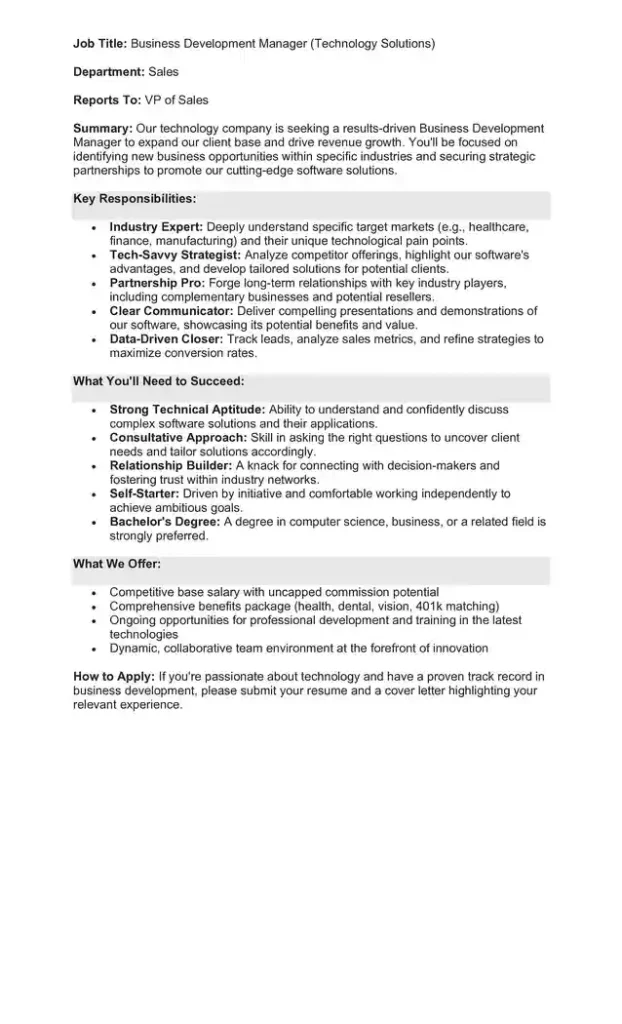
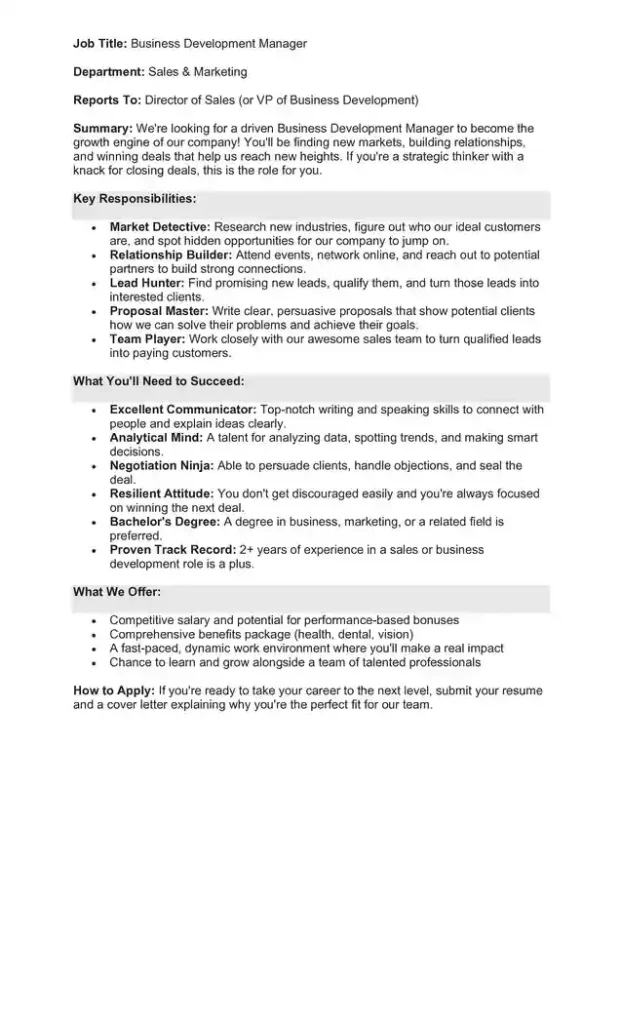
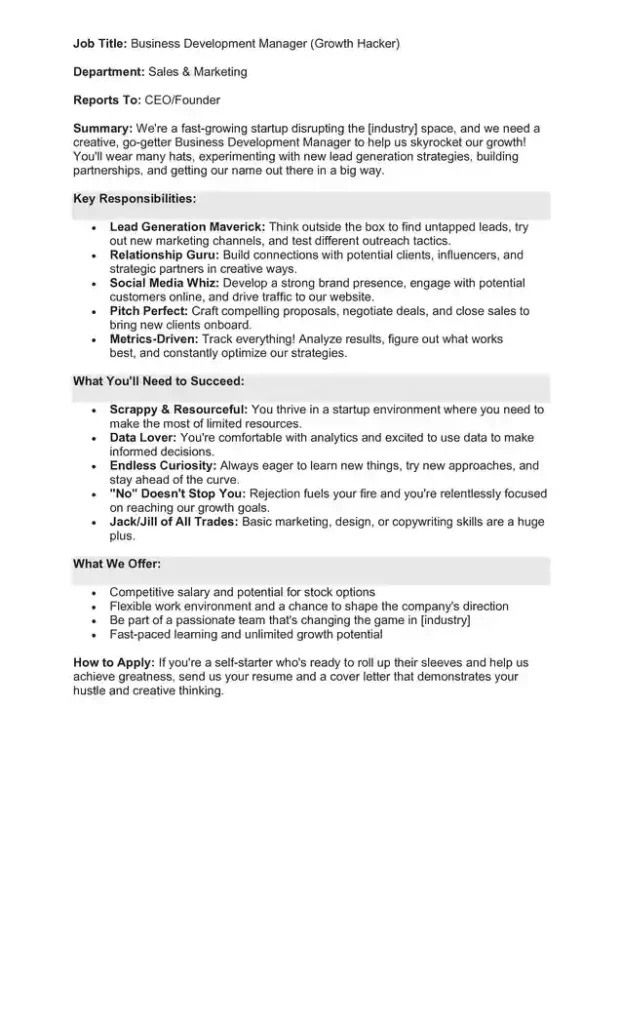
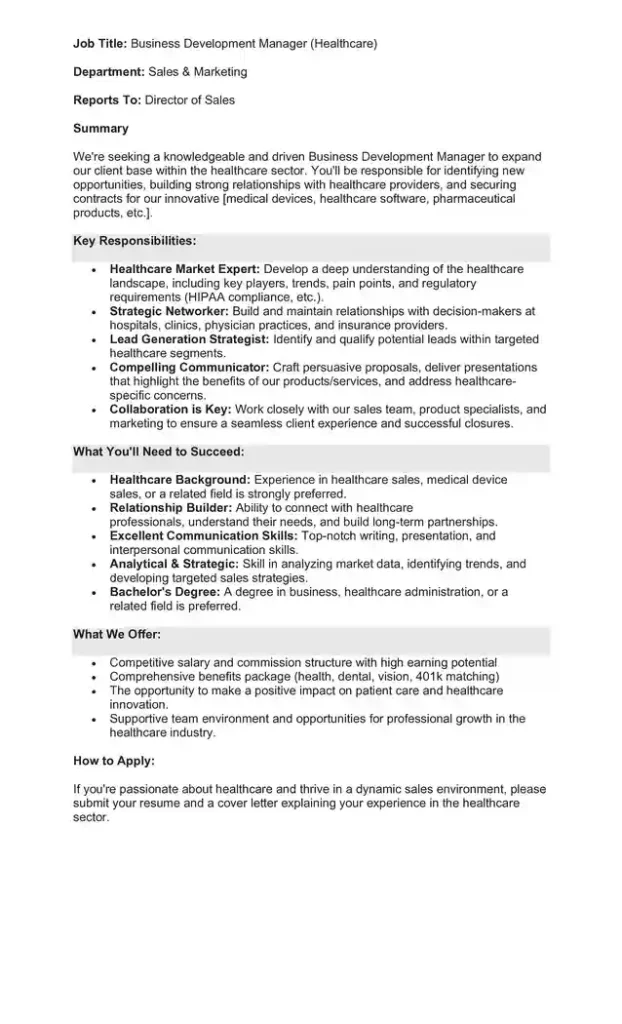
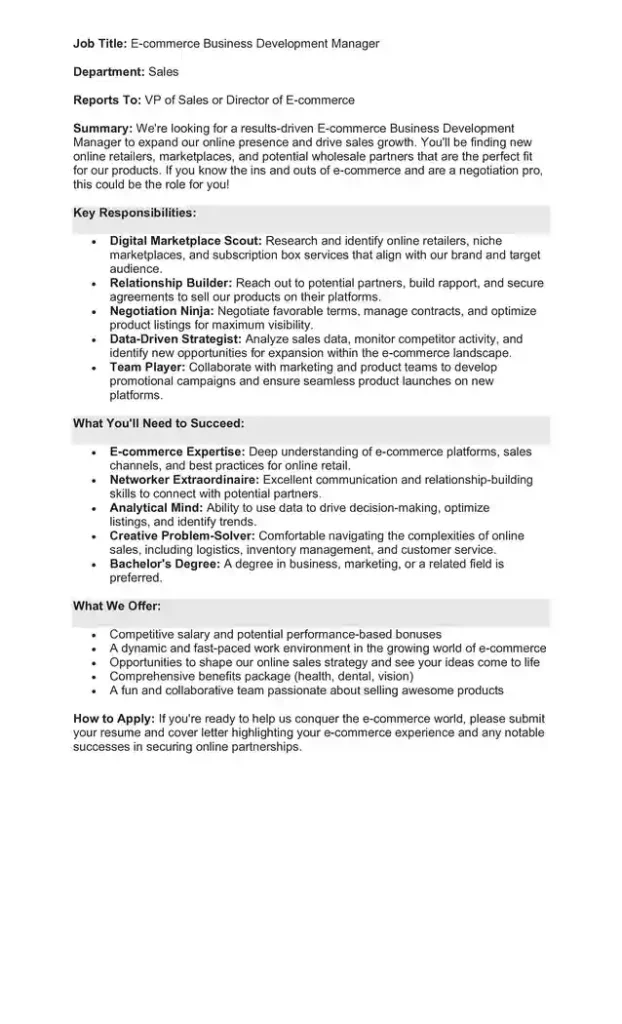
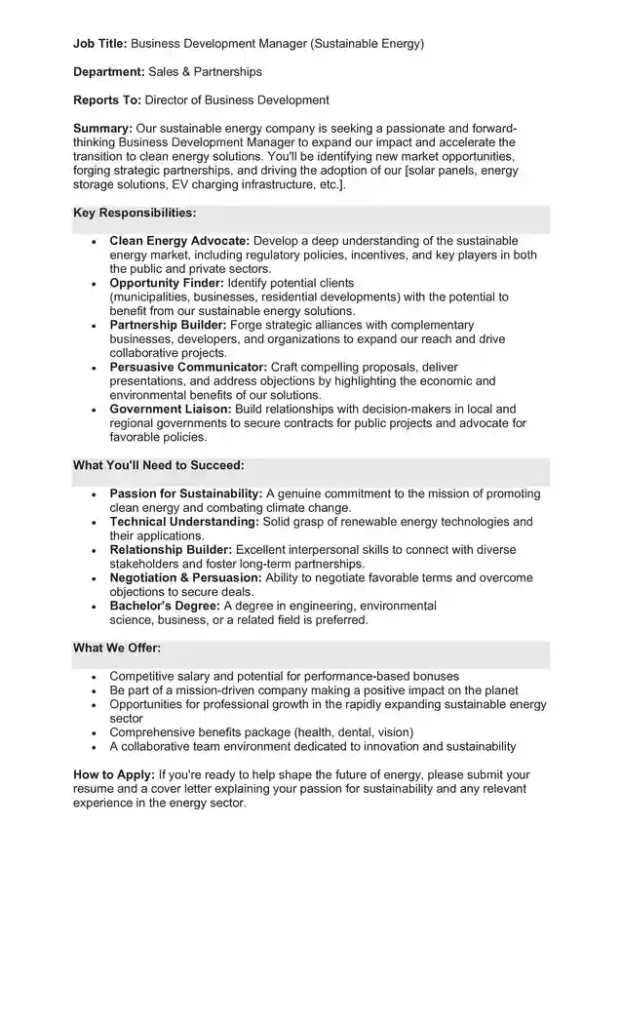
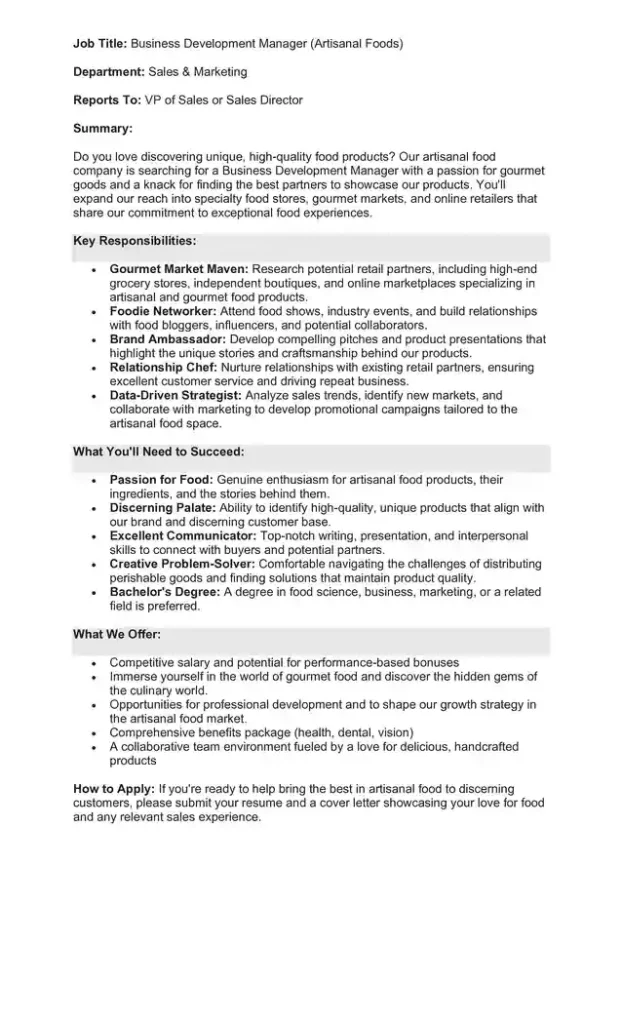
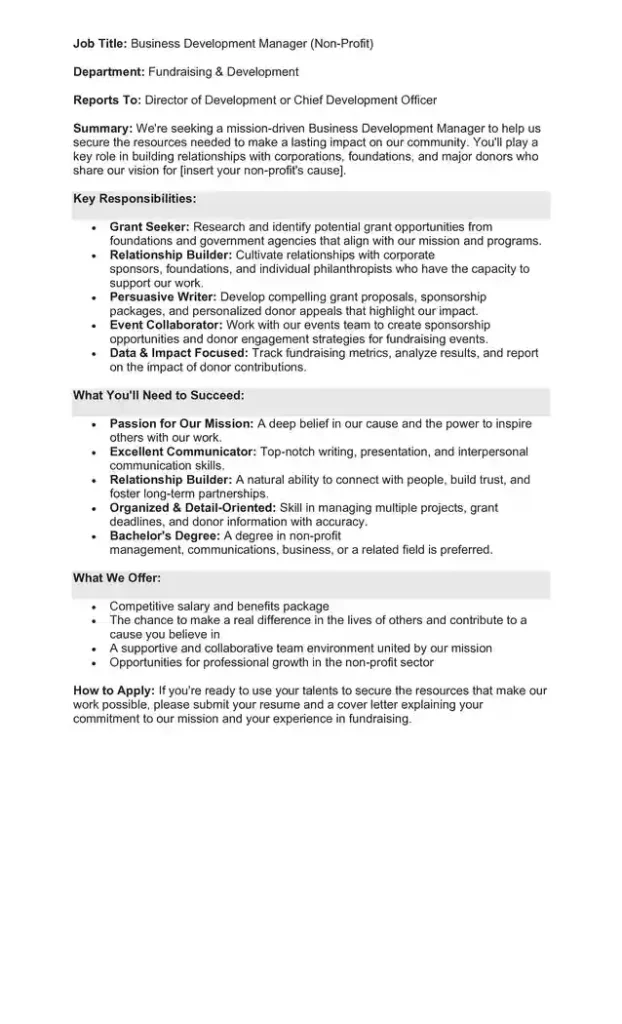
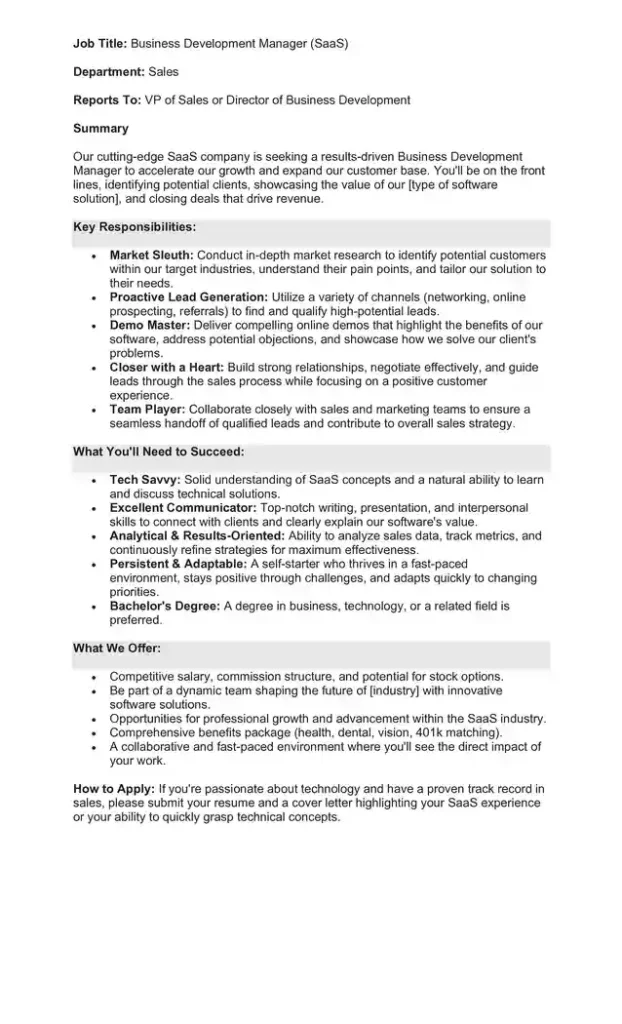
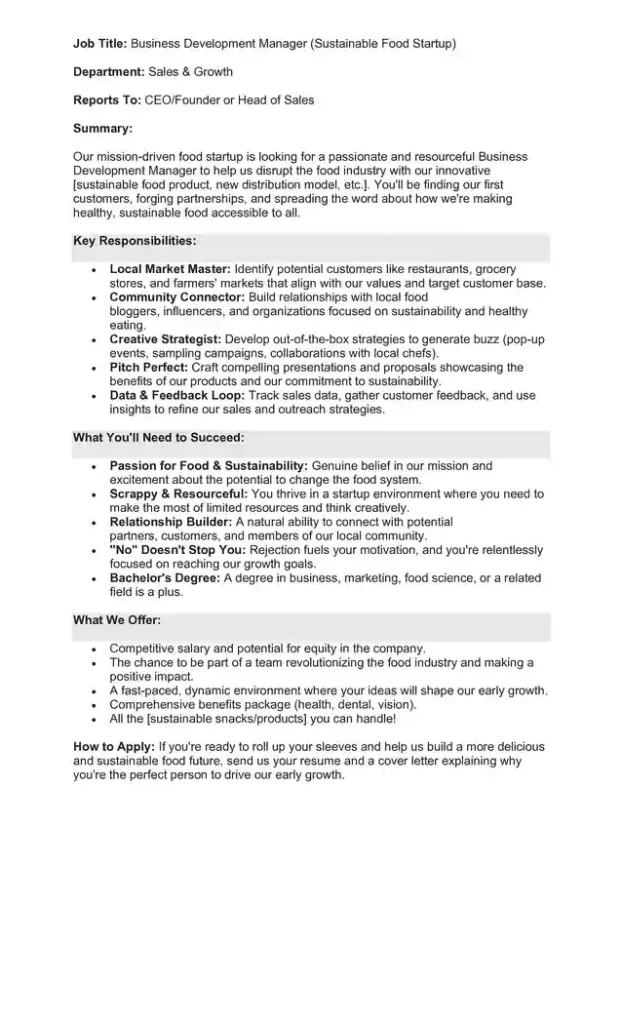
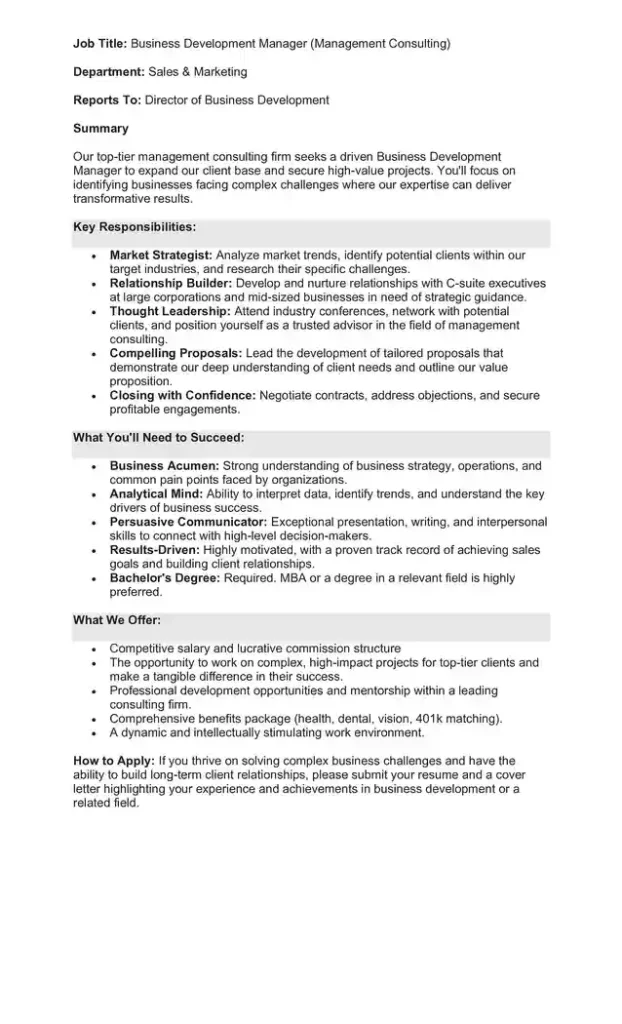
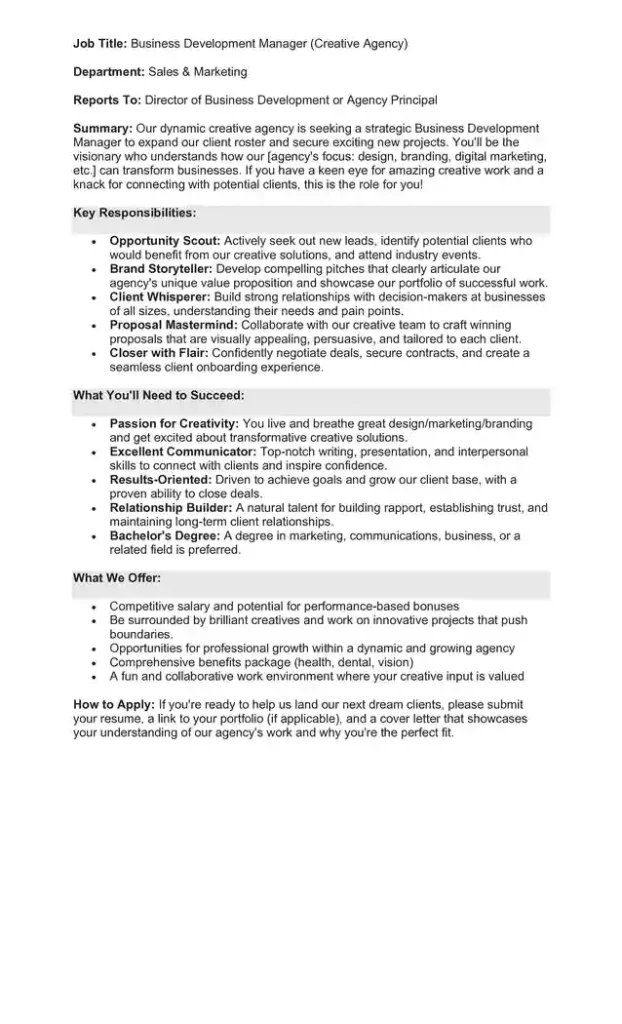
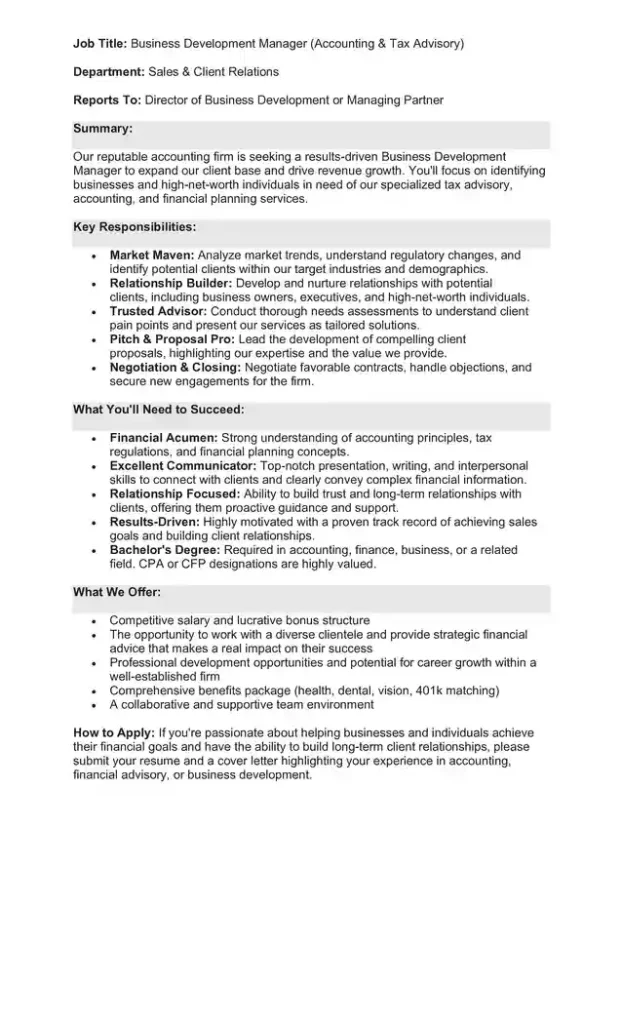
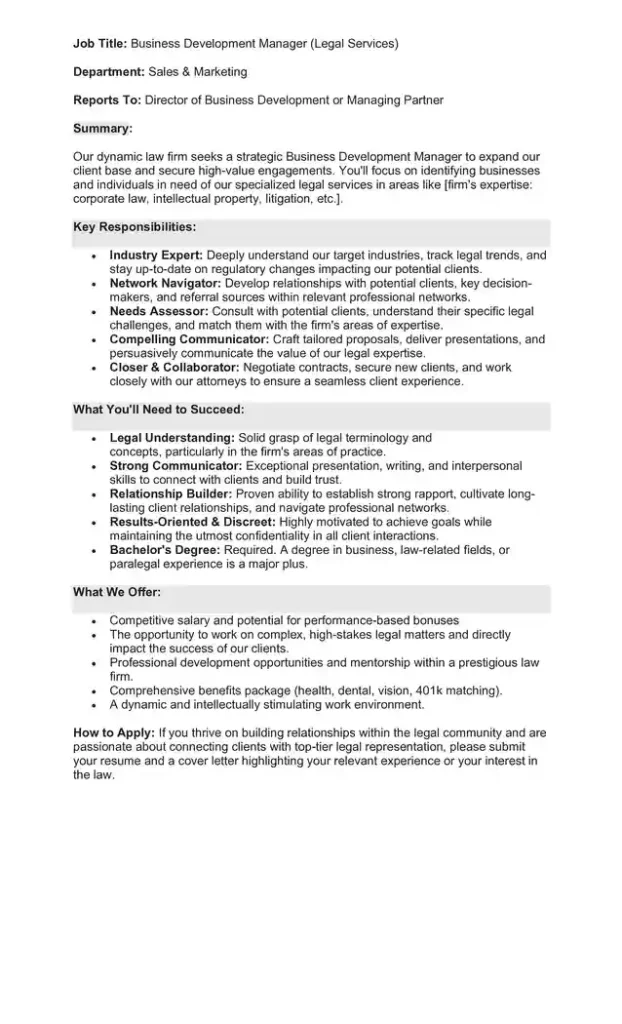
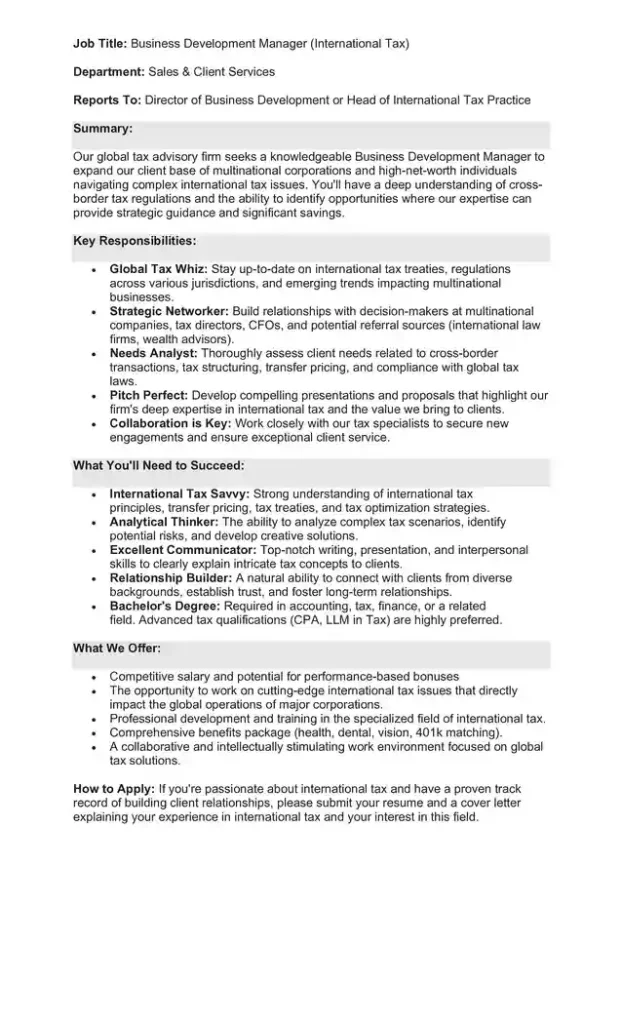

FAQ
Q: Do I need a college degree to be a BDM?
A: A degree in business or something similar helps, but it’s not always a must. If you have a talent for sales, building relationships, or know a lot about a specific industry, that can be even more important.
Q: What are some good starter jobs if I want to become a BDM later?
A: Try being a Sales Development Representative (SDR), a Market Research Analyst, or even working in customer service. These jobs give you great skills for business development.
Q: How can I get a BDM interview?
A: Show off your wins! On your resume, use numbers (like, “Grew leads by 25%”). Get to know people in the industry you want to work in, and write a unique cover letter for each job you apply for.
Q: Are there any certifications that would make me a better BDM candidate?
A: They’re not required, but certifications in sales techniques, managing projects, or knowing a lot about your industry can show you’re serious about professional growth.
Wrapping It Up
“Does this job description for a business development manager sound exciting? If it does, it’s time to start looking for your dream job! Check out big job boards like sample job description for a business development manager to find open positions and start your journey as a BDM.”

Alexander is a skilled HR expert who writes clear and compelling job descriptions. He has spent over 15 years in the HR field, helping companies find and keep the best employees. With a degree in Human Resources Management from the University of Chicago, he has the knowledge to back up his experience.







